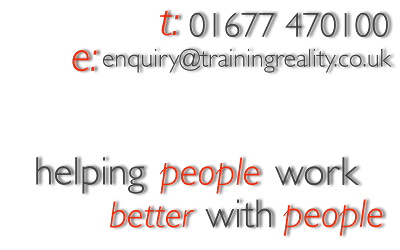Please press (at least!) one of these.
It costs you nothing, and (possibly) helps us spread the word!
...or "get back in your ****** box!"
Wednesday, 9 February 2011
This must be one of the most common, and most irritating, management clichés out there. All you need to do is "think outside the box" and all your problems will be solved. Indeed, you know what your problem is, don't you? You don't "think outside the box". Of course, the ever present danger with this conversational line (not that this type of phrase is generally used in proper conversations!) is that someone, soon, will add the phrase "blue sky thinking", and then we all need to get our coats...
As with last week's article on the clichés surrounding the "helicopter view", there are, rather annoyingly, some simple, fundamental and useful underlying truths in the clichés; but the wide-ranging poor use of the phrase tends to create exasperation rather than the outstanding new ideas and concepts that it (hopefully) is aiming for.
Before going any further, I ought to make a little confession - someone I know very well has an ingrained habit of justifying particularly crazy thoughts and ideas by saying that she is "thinking outside the box"; my general retort is that she is so far from the box, she can't even see it any more. I might therefore be a little biased on this subject!
Useful new ideas
The essence of this cliché is that it's important, useful and desirable to think in a way that is not totally constrained by the situation you're in and the past experience you have. Thinking about things with a "what if" mindset can really help to generate new ideas and possibilities.
I recently had the pleasure (not quite the right word!) of hearing about a meeting that had just taken place. An external person had been invited along to share some new ideas he had for a business; each and every one was shot down by someone who had been with the organisation for over 15 years, with some variation on the phrases "oh, we've tried that before", or "that wouldn't work here".
Challenging and asking some pointed questions ("how do you know?" or "why didn't it work last time"?) can help to break down some of the constraints that people put around change and newness.
Altering perspectives
More broadly, "thinking outside the box" might be about changing perspectives on things. From the outside, you can walk around and see all sides of something, so your thinking is not constrained either by the limits of past experience, or the perceptual position that you have. This, essentially, is what I'm attempting with this series of articles on management jargon and clichés: to take a fresh look at them and see whether it is possible to resurrect them; to extract anything positive from them.
Looking at something from an outsider's point of view, and indeed from the points of view of multiple different outsiders, can offer new and fresh perspectives.
Belittling
A cliché like this can be used as a put-down as well. Surely everyone knows we need to think outside the box; why are you being so narrow in your approach? This can be a rather sneaky and hard-to-challenge form of bullying, but it can be bullying none the less. If the phrase is being used to ridicule someone else's ideas, for being too conformist or too crazy, it's as unhelpful and destructive as any other.
Self-justification
Of course, some people do use this cliché as self-justification. They may not have thought something through at all; they may be saying the first thing that comes into their head; they may have no research, evidence or support for their idea, but, by saying that they are simply "thinking outside the box", they can make it harder for others to challenge them. Creativity is not an excuse for lack of rigor.
The cloak
This phrase, and similar ones, can also be used as a cloak for people to hide behind; a way of saying something but heading off potential challenges. In these circumstances, what lies behind it may not be a desire to irritate, a clichéd approach to things, or even a genuinely meant use of the phrase; it may simply demonstrate a lack of confidence in their own ideas.
--
The box is important. It's everything we currently have, and everything we've been. It's solid, it's survived ,and it hods everything together. A balanced approach is to think in a way that is respectful of that, but not utterly constrained by it.
Please press (at least!) one of these.
It costs you nothing, and (possibly) helps us spread the word!





